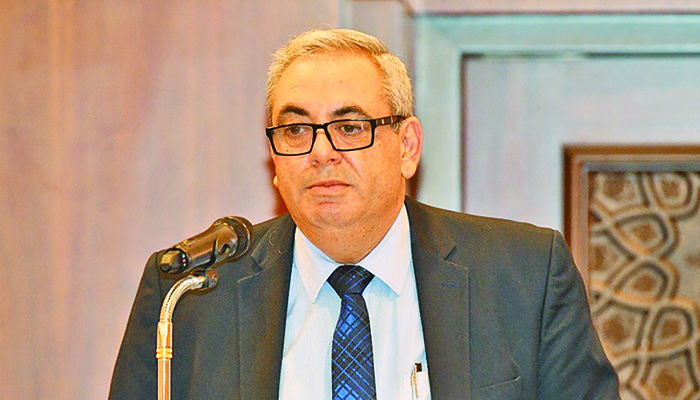
Muscat: Oman has handled the COVID-19 pandemic well due to “good planning”, the representative of the World Health Organization to the country has said.
Dr Jean Jabbour, the WHO representative to Oman, said a combination of factors, including execution of the immunisation programmes, implemented in the country well before the pandemic began and transparency on the part of the government in communicating COVID measures to the people enabled the country to handle the pandemic well.
“I really want to take this moment to acknowledge the transparency of the Supreme Committee here in Oman,” said Jabbour.
“They are doing fantastic work and are very transparent with the public. In 60 to 70 days, Oman reached the target of fully immunising 40 percent of its population: Both Omani and non-Omani. This is because of good planning.
“Oman in 2016 was ranked number one among all countries of the world when it came to the management of its National Immunisation Programme,” he added.
Vaccination programme
“The government has a very strong national vaccination programme and through strengthening of the primary healthcare systems in Oman, they have been able to reach most of their population and the catchment areas. That is why from the beginning, I had no worries that Oman would start its vaccination drive well and would boost its population’s immunity very quickly and that is what happened.”
Jabbour added that Oman exceeded the global target of vaccinating 40 percent of its population by December and expressed optimism towards increasing the uptake for booster doses.
During an interview with TTV, he discussed a number of issues pertaining to the pandemic, the WHO representative also stressed that while governments would do all they could to handle the coronavirus, it is also the job of every individual to keep himself and others safe.
“Every individual is responsible alongside the government to end the pandemic,” he explained.
Strong recommendations
“If we do not apply these measures, we are not going to end it. Oman is doing very well in terms of applying these measures -- it has strong recommendations through the Supreme Committee. These are very important as they come from the global advisory committee, the WHO, and other international bodies.
“It is based on science,” he said. “They do not apply any recommendation if it is not for the benefit of the Oman community: When I say community, I mean citizens and residents together. My thanks to the government that is taking care of both the citizens and the residents in Oman. Please take these recommendations seriously. Always take information from a reliable source – not from any unknown source – and apply it accordingly.”
During the initial days of the vaccine rollout, Jabbour had seen some people take to social media to voice concerns over why the vaccines had taken time to arrive in Oman. During the interview, he addressed this issue by explaining the process by which governments decide which vaccines are best for their populations.
“In the beginning, there were a lot of people saying on social media and elsewhere that the government had delayed procuring the vaccinations,” he revealed.
“It is not a matter of getting vaccines now, tomorrow, or the day after. It is based on how safe and effective the vaccines are. All of this is based on science and the relevant studies. Oman does not take any step, until it is strongly scientific, and evidence-based.
Pandemic
“During each pandemic or when there is a newly emerging infection, there will be challenges regarding production and government agreements with producers,” explained Jabbour.
“This is what happened at the beginning, but Oman will not take any step that does not provide 100 percent benefit to the entire population.
“That is why we ask people to follow government policy, listen to them and see what recommendations they issue,” he said.
“Why would you go and listen to other sources? Why would you listen to other policies? Every country has its own specific context. This is why you need to understand your government policy and thank God their policies are moving on the right track and progressing very well.”
Jean Jabbour also tried to quell rumours put forth by people who are sceptical of taking the vaccines owing to a number of reasons.
“We know that there are some anti-vaccine groups that increase the hesitancy of taking the vaccine,” he revealed. “But when these people are infected with the coronavirus, the importance of taking the vaccine becomes clear to them. Vaccines have been proven to rid so many diseases; our children around the world are healthy because of vaccines.
“There are some misconceptions among people that because vaccines were produced quickly, they are neither safe nor effective,” said Jabbour. “I ask them to please show me their scientific evidence: All they are saying are theories that are very far from science, from medicine and very far from protecting their community. I advise every single individual to help your government.”
Figures released by the Ministry of Health on Sunday, 13 February 2022, show that Oman recorded 4,701 infections over the weekend: 2,064 on Thursday the 10th, 1,295 on Friday the 11th and 1,342 on Saturday the 12th. However, more people recovered from COVID-19 (7,141) than those who tested positive, although sadly, 13 people died from the disease during this three-day period.
A total of 365,700 positive infections have been recorded in Oman since the start of the pandemic. 341,047 people have recovered, but unfortunately, 4,208 people have died from the virus.